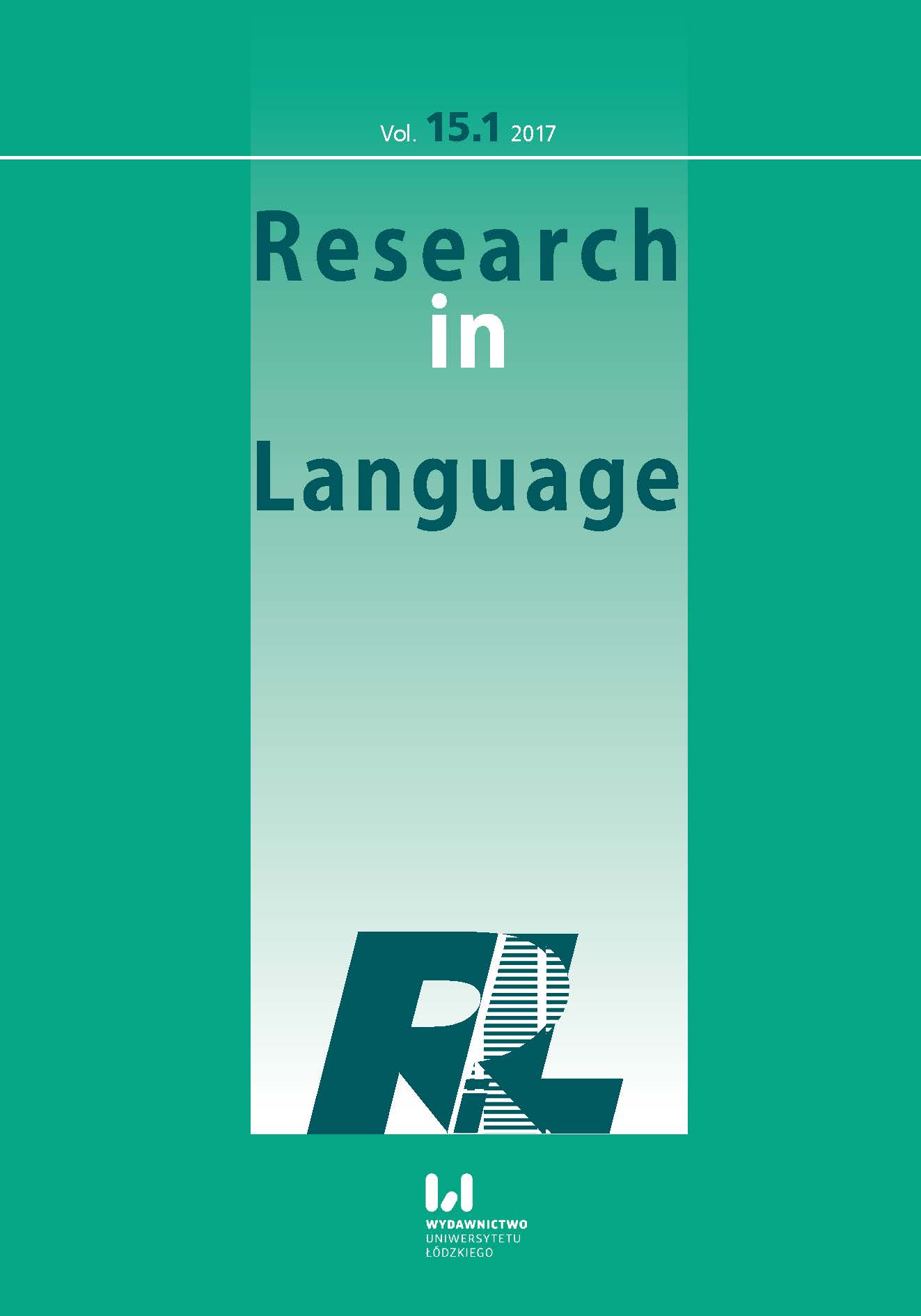The Treatment of Geographical Dialect in Literary Translation from the Perspective of Relevance Theory
DOI:
https://doi.org/10.1515/rela-2017-0004Keywords:
cognitive environment, communicative clue, dialect translation, processing effort, translation strategy, „The Secret Garden”Abstract
This paper discusses problems involved in the translation of literary works that apply linguistic varieties, especially geographical dialects. It surveys selected approaches to the functions of dialects in literature and to the strategies of dealing with linguistic variation in translation, arguing that the understanding of the issue may be deepened and systematized by applying notions drawn from relevance theory. The use of dialect in literary texts is interpreted as a communicative clue and the translators’ approach to its rendering is described with reference to the cognitive environment of the recipients and the balance of processing effort and communicative gain. Examples are drawn from the Polish translations of The Secret Garden by F.H. Burnett, the oldest coming from 1917 and the newest from 2012, which highlight the translators’ changing assumptions on the recipients’ cognitive environment reflected in the choice of the strategy of dialect rendition.
References
Adamczyk-Garbowska, Monika. 1988. Polskie tłumaczenia angielskiej literatury dziecięcej: problemy krytyki przekładu. Wrocław: Zakład Narodowy im. Ossolińskich.
Google Scholar
Balma, Philip. 2011. From Standardization to Dialect Compilation: A Brief History of Italian Dialect Poetry in English Translation. Translation Studies Journal 3(1). 1-13. [Online] Available from http://escholarship.org/uc/item/5r18r9dx [Accessed 2 November 2016]
Google Scholar
Berezowski, Leszek. 1997. Dialect in Translation. Wrocław: Wydawnictwo Uniwersytetu Wrocławskiego.
Google Scholar
Bonaffini, Luigi. 1997. Translating Dialect Literature. World Literature Today 71(2). 279-288.
Google Scholar
Burnett, Frances H. 1993. The Secret Garden. Ware, Hertfordshire: Wordsworth Classics.
Google Scholar
Burnett, Frances H. 1996 [1917]. Tajemniczy ogród. Translated by Jadwiga Włodarkiewicz. Warszawa: Pruszyński i S-ka.
Google Scholar
Burnett, Frances H. 1997. Tajemniczy ogród. Translated by Bogumiła Kaniewska. Poznań: Podsiedlik-Raniowski i Spółka.
Google Scholar
Burnett, Frances H. 1998. Tajemniczy ogród. Translated by Zbigniew Batko. Warszawa: Kama.
Google Scholar
Burnett, Frances H. 2005 [1995]. Tajemniczy ogród. Translated by Anna Staniewska. Wrocław: Siedmioróg.
Google Scholar
Burnett, Frances H. 2011. Tajemniczy ogród. Translated by Saskia Milaneau de Longchamp. Poznań: Vesper.
Google Scholar
Burnett, Frances H. 2012. Tajemniczy ogród. Translated by Paweł Beręsewicz. Kraków: Skrzat.
Google Scholar
Catford, John C. 1965. A Linguistic Theory of Translation. London: Oxford University Press.
Google Scholar
Dębska, Karolina. 2009. Neutralizacja różnorodności językowej a usuwanie obcości z przekładu. In Jerzy Brzozowski and Maria Filipowicz-Rudek (eds.), Między oryginałem a przekładem XV.Obcość kulturowa jako wyzwanie dla tłumacza, 53-72. Kraków: Księgarnia Akademicka.
Google Scholar
Fawcett, Peter. 1997. Translation and Language. Linguistic Theories Explained. Manchester: St. Jerome.
Google Scholar
Federici, Federico M. (ed.) 2011. Translating Dialects and Languages of Minorities. Challenges and Solutions. Bern: Peter Lang.
Google Scholar
Gutt, Ernst-August. 2000. Translation and Relevance. Cognition and Context. 2nd edn. Manchester: St. Jerome.
Google Scholar
Hatim, Basil and Ian Mason. 1990. Discourse and the Translator. London: Longman.
Google Scholar
Hejwowski, Krzysztof. 2010. O tłumaczeniu aluzji językowych. In Roman Lewicki (ed.), Przekład – język – kultura. Tom II, 41-56. Lublin: Wydawnictwo Uniwersytetu Marii Curie-Skłodowskiej.
Google Scholar
Klemensiewicz, Zenon. 1955. Przekład jako zagadnienie językoznawstwa. In Michał Rusinek (ed.), O sztuce tłumaczenia, 85-97. Wrocław: Zakład Narodowy im. Ossolińskich.
Google Scholar
Korzeniowska, Aniela. 2004. The Challenge of the Non-standard and the Notion of Untranslatability in Reference to Three Scottish Writers: Tom Leonard, James Kelman and William McIlvanney. In Olga Kubińska and Wojciech Kubiński (eds.), Przekładając nieprzekładalne, volume II, 93-100. Gdańsk: Wydawnictwo Uniwersytetu Gdańskiego.
Google Scholar
Korzeniowska, Aniela. 2013. James Kelman’s Polish 2011 Début with Jak późno było, jak późno (How late it was, how late) and its Position within the Polish Literary Polysystem. In Aniela Korzeniowska and Izabela Szymańska (eds.), Scotland in Europe/Europe in Scotland. Links-Dialogues-Analogies, 129-140. Warszawa: Wydawnictwo Naukowe Semper.
Google Scholar
Kurzowa, Zofia. 1983. Polszczyzna Lwowa i kresów południowo-wschodnich do roku 1939. Warszawa: Państwowe Wydawnictwo Naukowe.
Google Scholar
Newmark, Peter. 1988. A Textbook of Translation. New York: Prentice Hall.
Google Scholar
Oittinen, Riitta. 2006. No Innocent Act. On the Ethics of Translating for Children. In Jan Van Coillie and Walter P. Verschueren (eds.), Children’s Literature in Translation. Challenges andStrategies, 35-45. Manchester and Kinderhook: St Jerome.
Google Scholar
Ramos Pinto, Sara. 2009. How important is the way you put it? A discussion on the translation of linguistic varieties. Target 21(2). 289-307. doi: 10.1075/target.21.2.04pin
Google Scholar
Shavit, Zohar. 1986. Poetics of Children’s Literature. Athens, Georgia: University of Georgia Press.
Google Scholar
Szymańska, Izabela. 2011. Mosaics. A Construction-Grammar-Based Approach to Translation. Warszawa: Wydawnictwo Naukowe Semper.
Google Scholar
Tabbert, Reinbert. 2002. Approaches to the Translation of Children’s Literature: A Review of Critical Studies since 1960. Target 14(2). 303-351. doi: 10.1075/target.14.2.06tab
Google Scholar
Wojtasiewicz, Olgierd. 1992. Wstęp do teorii tłumaczenia. 2nd edn. Warszawa: TEPIS.
Google Scholar
Downloads
Published
How to Cite
Issue
Section
License
Copyright (c) 2017 © Copyright by Authors, Łódź 2017; © Copyright for this edition by Uniwersytet Łódzki, Łódź 2017

This work is licensed under a Creative Commons Attribution-NonCommercial-NoDerivatives 4.0 International License.










